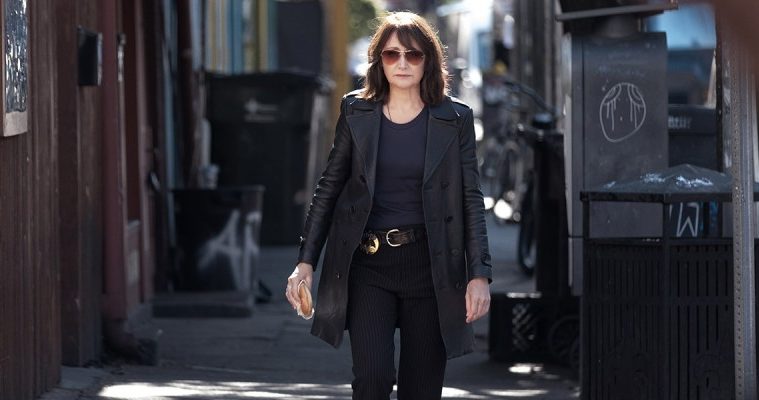It’s comforting to discover that the Martin Amis novel Carol Morley’s Out of Blue adapts is considered a “comedic parody” because I couldn’t wrap my head around the blatant noir affectation she had her stellar cast provide. An off-putting drama full of red herrings meant to distract from a predictable end, despite those artificial performances being intentional, the sheer fact I wasn’t sure if I should be laughing renders the result less than successful.
With that said, though, it is interesting. Centering upon the death of an astrophysicist and expert in black holes (Mamie Gummer’s Jennifer Rockwell), the story follows Detective Mike Hoolihan (Patricia Clarkson) and her quest to bring a murderer to justice. After reading a synopsis of the novel it seems as though that’s where the similarities end. Instead of being relegated to menial work around the precinct like her literary counterpart, Mike is known as the city’s best closer when it comes to homicides. And rather than being asked to work the case by her friend Colonel Tom Rockwell (James Caan as the deceased’s father), he’s introduced as a complete stranger and perhaps even a suspect. Anyone who was close to Jennifer needs to be considered one.
What’s intriguing is the influx of science, thought experiments, and metaphysical notions of existence, non-existence, and déjà vu that continuously float by. Jennifer had been talking about dark matter the night she was shot and according to her boyfriend Duncan (Jonathan Majors) she was a staunch believer in the multiverse. Her colleague Professor Strammi (Toby Jones) speaks about Schrödinger’s cat when explaining his alibi, a fresh-faced reporter (Devyn A. Tyler’s Stella Honey) keeps disappearing (if she’s there at all), and Mike herself begins suffering from fainting spells whenever a detail conjures repressed images from a childhood she doesn’t actually remember. It’s easy to question what’s real, the acting style only making things more prone to disbelief. Yet Mike plugs away regardless, her skepticism always winning out above fantasy.

The question you must ask is whether or not it adds up to anything worthwhile. It will for some, but not for me. Morley finds herself trying to do too much with this simple murder mystery premise. Somehow this dead woman is working magic from the grave to allow Mike the foresight to uncover clues about an old serial killer who was never caught as well as her own secretive past. Could everything be connected? Should we laugh with the dismissive sarcasm for which Mike counters any notion of philosophical thought or appreciate her moxie to want to take things at face value? It’s tough to answer that last one because it’s specifically her inability to take things at face value that points her in the right direction.
It’s almost as though the science is infiltrating her consciousness and throwing her off her game. The world is intentionally holding Mike’s crackerjack intuition at bay so she can dwell in the here and now with these characters long enough to figure out there’s more than meets the eye with each. Morley unfortunately prevents us from fully embracing this idea by keeping too many of the parody’s comic notes despite seemingly changing the overall tone to severe. Everything still comes off as overwrought, but not in a joking way. So we wait for something unexpected, watching a blue and red dot in the sky inch closer and closer. And we follow false steps as intended only to see those vehemently accused inevitably assist their accuser like nothing happened.

The mood swings that result will give you whiplash whether its Duncan’s mousey introversions erupting into rage or Jennifer’s mother Miriam (Jacki Weaver) devolving into a sort of shameless hyperactivity to deliver an extremely weird dinner scene. A lot of what happens is weird and disjointed until we can’t help wondering if Mike is back on the bottle—why else show her at an AA meeting? Unfortunately the planting of that detail without sufficient payoff isn’t out of the ordinary since much of what we learn is superfluous. We assume the sharp glimpses of the past are important, but we can’t be sure they aren’t glimpses of the future until everything is spelled out. By that time it’s difficult to muster any enthusiasm because each new reveal generally lands with a whimper rather than roar.
I’m not even certain I can honestly say the acting is good enough to balance out the wobbly nature of the rest because it’s all so over-the-top. From the opening line spoken by Gummer in a southern drawl to Mike’s captain (Yolonda Ross) leaning heavily onto hard-boiled prose, we’re never certain where we stand with them. Clarkson is the least caricatured of the bunch, but even her tough as nails demeanor wears you down by its oppressive monotony. There isn’t one shred of emotion during the whole film to help us invest—just yelling and stoicism alternating until naturalism is officially thrown out the window. I get that Mike’s discovering who she is against this backdrop of infinity, but why? Why now? Why should any of us care?
Out of Blue premiered at the Toronto International Film Festival.

